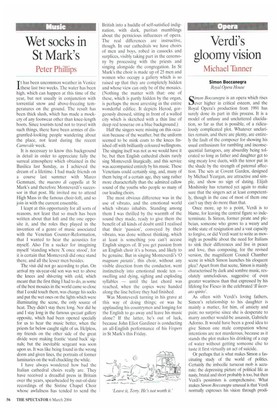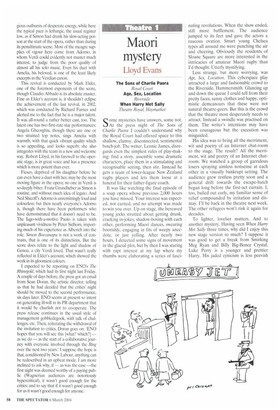Verdi's gloomy vision
Michael Tanner
Simon Boccanegra Royal Opera House
Simon Boceanegra is an opera which rises ever higher in critical esteem, and the Royal Opera's production from 1991 has surely done its part in this process. It is a model of unfussy and uncluttered elucidation, so far as that is possible, of a ridiculously complicated plot. Whatever unclarities remain, and there are plenty, are entirely the fault of the composer for showing his usual enthusiasm for rambling and inconsequential farragoes, any absurdity being tolerated so long as father and daughter get to sing meaty love duets, with the tenor put in the shade by the strength of paternal affection. The sets at Covent Garden, designed by Michael Yeargan, are attractive and simple, and show no sign of dating. Elijah Moshinsky has returned yet again to make sure that the singers act at least competently, though in the case of most of them one can't say they do more than that.
Once more, up to a point, Verdi is to blame, for leaving the central figure so indeterminate. Is Simon, former pirate and plebeian, someone who grows to a weary and noble state of resignation and a vast capacity to forgive, or did Verdi want to write as movingly as possible about the need for Italians to sink their differences and live in peace and love, thus composing, for the revised version, the magnificent Council Chamber scene in which Simon launches his eloquent plea? Apart from that scene, Simon is mainly characterised by dark and sombre music, resolutely unmelodious, suggestive of even greater weariness than that expressed by his lifelong foe Fiesco in the celebrated lacerato spirito'.
As often with Verdi's loving fathers, Simon's relationship to his daughter is mainly a matter, for him, of anxiety and pain; no surprise since she is desperate to marry another would-be assassin, Gabriele Adorn°. It would have been a good idea to give Simon one male companion whose intentions are not murderous, because as it stands the plot makes his drinking of a cup of water without getting someone else to taste it first virtually an act of suicide.
Or perhaps that is what makes Simon a fascinating study of the world of politics. Certainly the imbecilic turncoat mob is accurate; the depressing picture of political life as nasty, brutal and short probably is too, but then Verdi's pessimism is comprehensive. What makes Simon Boccanegra unusual is that Verdi normally expresses his vision through prodi gious outbursts of desperate energy, while here the typical pace is lethargic, the usual register low, as if Simon had drunk his slow-acting poison at the start of the opera, rather than during its penultimate scene. Most of the meagre supplies of vigour here come from Adorn°, in whom Verdi could evidently not muster much interest, to judge from the poor quality of almost all his solo music. Even his duet with Amelia, his beloved, is one of the least likely excerpts in the Verdian canon.
This revival is conducted by Mark Elder, one of the foremost exponents of the score, though Claudio Abbado is its absolute master. Fine as Elder's account is, it shouldn't eclipse the achievement of the last revival, in 2002, which was conducted by Richard Fames and alerted me to the fact that he is a major talent. It was all-round a rather better cast, too. The latest one has two first-rate star performances: Angela Gheorghiu, though there are one or two strained top notes, sings Amelia with warmth, with that quick vibrant quality which is so appealing, and looks superb; she also integrates with the team in a new and welcome way. Robert Lloyd, in his farewell to the operatic stage, is in great voice and has a presence which is more potent than ever.
Fiesco, deprived of his daughter before he can even have a duet with her, may be the most moving figure in the opera; no one in Verdi is so deeply bitter. Franz Grundheber as Simon is routine, and without much idea of legato. And Neil Shicoff's Adorn° is unremittingly loud and colourless; but then nearly evelyone's Adorno is, though there have been performers who have demonstrated that it doesn't need to be. The Iago-with-a-motive Paolo is taken with unpleasant vividness by Peter Sidhom, importing much of his experience as Alberich into the role. Simon Boccanegm is not a work of contrasts, that is one of its distinctions. But the score does relate to the light and shadow of Genoa, a city Verdi loved. That wasn't really reflected in Elder's account, which showed the work in its gloomiest colours.
I expected to be reporting on ENO's The Rhinegold, which had its first night last Friday. A couple of days before, the press got an email from Sean Doran, the artistic director, telling us that he had decided that the critics' night should be moved to the second performance, six days later. ENO seems at present so intent on generating ill-will in its PR department that it would be churlish not to co-operate. The press release continues in the usual style of management gobbledegook. with talk of challenges, etc. Then, reiterating the withdrawal of the invitation to critics, Doran goes on: 'ENO hopes that you will see this [what? which?] — as we do — as the start of a collaborative journey with evetyone involved through the Ring over the next two years.' I suppose the hope is that, conditioned by New Labour, anything can be redescribed in an upbeat mode. I am more inclined to ask why, if— as was the case —the first night was deemed worthy of a paying public (Wagnerian audiences are notoriously hypercritical), it wasn't good enough for the critics; and to say that if it wasn't good enough for us it wasn't good enough for anyone.



















































































 Previous page
Previous page